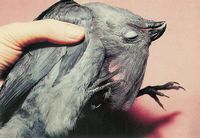WILD BIRD RESCUE

Poisoned Grey Lourie. Fortunately, emergency first aid saved the bird from death.
Because of the irresponsible and careless way in which poisons are used by certain sections of the farming and gardening public, poisoning of birds is a very frequent occurrence. And thatís not to mention the criminally culpable few who deliberately put out poisons intended for birds!
SYMPTOMS OF POISONING
- Unexplained paralysis, often of the legs. Take care not to confuse with a back injury.
- Lack of co-ordination. Falling about and flapping.
- Drowsiness and dribbling from the mouth, sign of nauseousness.
- Rapid and irregular breathing, not to be confused with a lung or airsack injury.
- Dilated pupils.
- Irregular and rapid heartbeat, not to be confused with stress-induced rapid heartbeat.
- Fluctuating body temperature
- Faeces and oral dribble smell of poison
- Black, tarry faeces
- Sickly sweet smell at mouth
FIRST AID FOR POISONING
Poisoning can be difficult for the inexperienced to treat. Itís essential you get help URGENTLY as time is of the essence. Wings in Need on (012)804-7202 or the Raptor Conservation/Poison Action/Vulture Study Group on 082-446-8946 will be able to provide immediate advice and assistance. While waiting for help, the following basic first aid may save the birdís life:
- Provide warmth (+- 35C) and quiet to stabilize the birdís body temperature.
- For the first two hours repeatedly (but carefully) flush the birdís system with copious quantities of emergency oral electrolytes (see February 1999 Animaltalk for details).
- Should help be unavailable after two hours, administer powdered Kaolin or Activated Charcoal (available from your chemist) orally to absorb the poison.
- Get the bird to a rescue and rehabilitation centre.
AVOID POISONING BIRDS
Most garden pests can be controlled without the use of poisons. Should it be essential to use poison, try to use the least harmful and most specific poison for the problem. Remember, if a little is good, a lot is NOT better! Be responsible, and help save our birds.
By Gordon M Duncan & Wings in Need
Animal Talk May 1999
